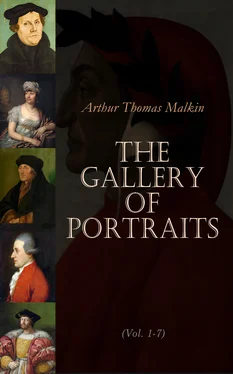In 1601 Rosny visited England, under pretence of travelling for his amusement, but in reality to ascertain the political views, and to secure the friendship of Elizabeth. On the Queen’s death, a formal embassy to James I. was contemplated, but a dangerous illness which the King suffered at Fontainebleau delayed this measure. Henry, who thought he was dying, sent for the long-tried Rosny to his bed-side, and in his presence he desired the Queen to retain his faithful minister, as the welfare of herself, her family, and of the nation were dear to her. The King, however, recovered, and in the month of June, 1603, Rosny, with a numerous suite, departed on his mission. After a residence of several weeks in England, he succeeded in concluding an advantageous treaty with James I.
The following year he composed a treatise on religious tolerance, which he at one time hoped might reconcile the animosities of the Catholics and Protestants. If he failed in this, he left an example, rare at that time, of an enlightened and liberal spirit. Shortly after he wrote a memorial indicating the means by which the commerce and finances of France might be still further improved. At that time the political sciences could scarcely be said to exist; and it is not to be supposed that the minister’s views were at all times just and enlarged. They show, at all events, that he looked to the industry of the people as the source of national wealth; and to their welfare as one, at least, of the objects of government. “Tillage and pasturage,” it was a favourite saying of his, “are the two paps by which France is nourished—the real treasures of Peru.” To manufactures he was less favourable, and his obstinacy on this head retarded many of Henry’s schemes for the encouragement of national industry. His real glory as a minister is to be sought in the exactness which he introduced into the management of the finances; and in the vigour with which he repressed peculation in his subordinates, and gave the whole weight of his influence to check the needless expenditure of a profligate court, to curtail those feudal claims which bore hardest on the vassals, and to oppose all privileges and monopolies, commonly bestowed upon courtiers in those days, which cramp the prosperity of a nation, to put a comparatively trifling sum into the pocket of a single person. One day the Duchesse de Verneuil, one of Henry’s favourites, remonstrated with him for his severity in this respect, alleging that the King had a good right to make presents to his mistresses and nobility. His answer should be generally known. “This were well, Madam, if the King took the money from his own purse; but it is against reason to take it from the shopkeepers, artisans, and agricultural labourers, since it is they who support the King and all of us, and they would be well content with a single master, without having so many cousins, relations, and mistresses to maintain.” His enemies insinuated that in the service of the state he had not neglected his own interest; and it is certain that he acquired immense wealth. Cardinal Richelieu, however, no friend to him, contents himself with the insinuation that if the last years of his administration were less austere than the first, it could not, at least, be said that they were profitable to himself without being very profitable to the state also.
To his other offices he added those of Grand Master of the Ordnance, and Surveyor-General of Public Works. The artillery had always been a favourite branch of the service with him; and he was esteemed one of the best generals of the age for the attack or defence of fortified places. As Master of the Ordnance he mainly contributed to the success of the war with the Duke of Savoy. The army was well paid and provided, the artillery always at its place at the proper time, and a general reform was felt throughout the service. In peace he was not less active in superintending the construction and repair of fortifications; and in those still more valuable labours which tend to facilitate intercourse, and provide for the internal wants of a nation. One of his chief works was a canal to join the Seine and Loire. There were few good engineers in those times, and Rosny, with his usual industry and earnestness, went himself to the spot and superintended the commencement of the work he had projected.
In 1606, after many brief quarrels between him and his master, caused chiefly by the intrigues of Henry’s mistresses and worthless courtiers, Rosny was created Duc de Sully and a Peer of France.
The licentiousness of the King, and the power he allowed his mistresses to obtain over him, had continually thwarted Sully and undone much of the good they had together proposed and executed. The minister’s remonstrances were frequent, bold, and at times even violent; indeed, his whole life had been distinguished by an honest bluntness; but the propensities of the amorous monarch were incurable, and his faithful servant had the mortification of seeing him disgrace the last years of his life by an infatuation for the Princess of Condé. Henry had already determined on a war with his old enemies the Spaniards, when the flight of this lady with her husband, who took refuge in the states of the house of Austria, induced him to hurry on his preparations to attack both the Emperor and the King of Spain. Sully, at this time, had amassed forty millions of livres in the treasury of the state, and he engaged moreover to increase this sum to sixty or to seventy millions without laying on any new taxes. He had also provided the most numerous and magnificent corps of artillery that had ever been seen in Europe. But in the midst of these grand preparations Henry’s mind was agitated by his insane passion for the Princess of Condé, and oppressed by a presentiment of his fate. He was indeed told on every hand that plots were laid against his life; his romantic courage forsook him, he became absent and suspicious, and at last distrusted even his faithful minister.
Sully now no longer saw his master except at short intervals, and lived, retired from the court, at the Arsenal, his official residence as Grand Master of the Artillery.
The naturally confident and noble nature of Henry, and his old attachment for the sharer in all his fortunes, triumphed however over his weaknesses and illusions, and he determined to pay Sully a visit and to excuse himself for his late coldness. With these amiable intentions the King left his palace, and was on his way to the Arsenal in an open carriage, when he was stabbed to the heart by the fanatic Ravaillac.
On the death of Henry IV. Sully would have continued his valuable services under the Queen-widow, Mary de’ Medici, who was appointed Regent, but that Princess resigning herself and the government of the state to intriguing Italians, headed by the unpopular Concini, the honest and indignant minister quitted office and the court for ever, and retired to his estates.
The life Sully led in his retreat was most rational and dignified. Unmoved by the ingratitude of the court, of which he was continually receiving fresh proofs, he continued to love the country he had so long governed; and though a zealous Protestant to the last, he would never join in the intrigues of the Hugonots, which he dreaded might renew the horrors of civil war. To find occupation for his active mind he dictated his Memoirs to four secretaries, whom, for many years, he retained in his service, and who, in the ‘Economies Royales,’ better known under the title of ‘Mémoires de Sully,’ preserved not only the most interesting details of the life of their noble master and of Henry IV., but the fullest account of the history and policy, manners and customs, of the age in which Sully lived. Neither the occupations of war nor of politics, in which he had been absorbed for thirty-four years, had eradicated his original taste for polite literature; and in his retirement he composed many pieces not only in prose but in verse. One of his poetical compositions, which is a parallel between Henry IV. and Julius Cæsar, was translated into Latin and much admired throughout Europe.
Читать дальше












